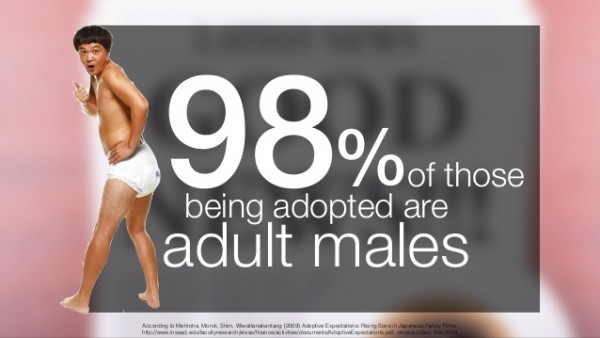This is because of a Japanese culture called 養子縁組 (youshi engumi). A tradition Japanese have had for hundreds of years to be able to hand down family business to a male leader where the daughter marry a guy and he becomes part of the family to run the business. In Japan, it is important that the company or institution is seen as a family-run group because it is appropriate in the eyes of the society.
When an executive of a business company only has daughters, he is not able to make his daughter replace him. Scholars say, this is because of the impact Tokugawa Era (1603-1867) had on Japanese ways of running business. Japan's civil code dictated how a family’s wealth would be passed on after the death of the family elder.Money and assets were traditionally passed through male lines in the family starting with the eldest. However, if a family did not have any blood-related sons, the law said that adopted sons could carry on the family name, business, and receive the wealth upon the death of the head of the family.
That is when another tradition called お見合い (omiai)/ arranged marriage comes into play. Executives who seek to hand down the company to the next heir, look for a 20-30 year-old male, with high education background, probably from a good family to go on a dinner date with their daughter leading to a "relationship" ending up in marriage. This man has to be perfect in the executive's eyes, meeting all expectations. When this man marry his daughter, not only he becomes a son in law but also he goes through a process of truly being adopted as their son. Even without blood connection, he is now eligible to run the business.


Some times, executives have sons but they still choose to hand down the company to the adopted son. Competence is key for a man to be chosen as a heir.
Take Suzuki a Japanese prestigious motors/car company around the world for example. Suzuki’s chairman and CEO, 81 year-old Osamu Suzuki, is an adopted son(the fourth one in fact) to run the company. When it came time, Osamu Suzuki chose his son-in-law, Hirotaka Ono, as his heir, rather than his biological son. Ono married Suzuki’s eldest daughter, just as Suzuki had done a generation prior. But in December 2007, Ono died of cancer, forcing Osamu to return as CEO. As of April 2011, Osamu had created a four person board to help run the company, led by his own biological son, Toshihiro Suzuki. Toshihiro might well become the first blood-related Suzuki scion in four generations, but it’s far from certain, and of course, he will always be the second choice of his father.
It is though, questionable if this male as a leader preference is necessary. This is probably the reason why so many females are not able to make a difference in politics, media business, medical fields and so many other business when this is changing in places such as Europe and The United States.
There is still a strong sexist concept in Japan where women are supposed to only get married and take care of the house as well as the children. With super-aged society, lack of man power and many other factors that affect Japanese economy negatively, perhaps Japan need to give a chance to women to show what they are capable of. In my opinion I don't think they would disappoint.